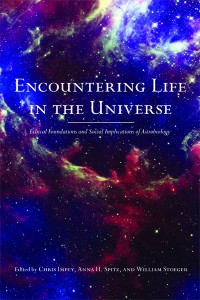When I read stories such as this one, I often wonder if it is part of the over all disclosure plan. Even if the authors have no conscious knowledge that they were being used as a piece in the disclosure puzzle, it seems plausible. No matter how you slice it, when you start debating ethical, moral and social implications of finding life in the universe, you have moved well past the question of.........Is There Life In the Universe?
Also not to sound like a conspiracy theorist, but have you ever noticed how often someone from the University of Arizona has been quoted in the press.
Countless times we have seen them debunking certain aspect of space, the universe or even UFOs. Most of us don't look to closely at the fine print, in press releases or announcement concerning space. When you start to see same person, organization or university over and over it begins to stick out like a sore thumb. Just a little food for thought.
Richard
Also not to sound like a conspiracy theorist, but have you ever noticed how often someone from the University of Arizona has been quoted in the press.
Countless times we have seen them debunking certain aspect of space, the universe or even UFOs. Most of us don't look to closely at the fine print, in press releases or announcement concerning space. When you start to see same person, organization or university over and over it begins to stick out like a sore thumb. Just a little food for thought.
Richard
 |
| Mark Armao/ The Daily Wildcat Chris Impey and Anna Spitz are co-editors of " Encountering Life in the Universe: Ethical Foundations and Social Implications |
The book, titled “Encountering Life in the Universe: Ethical Foundations and Social Implications of Astrobiology,” is a collection of articles by astronomers, philosophers and biologists. Many UA faculty and staff members contributed to and edited the book.
Astrobiology is the study of origin, distribution and evolution of life in the universe. The book discusses some of the key issues in the rapidly evolving field, as well as the social and ethical significance of the work of astrobiologists.
The book looks beyond research and into what the implications are for society, according to co-editor Anna Spitz, communication and public engagement lead for the UA’s OSIRIS-REx asteroid sample return mission.
The idea for “Encountering Life in the Universe” was born out of an astrobiology conference hosted at the UA in 2008, said co-editor Chris Impey, a UA distinguished professor and deputy head of the UA’s department of astronomy and Steward Observatory.
The attendees of the conference discussed the implications of finding life outside of our solar system, as well as finding it on one of our closest neighbors.
“If we found microbes on, say, Mars, do we risk bringing them back to the Earth?” Impey said. “There could be hazards associated with that.”
Another question that arises, Impey said, is whether or not to alter nearby planets like Mars, risking the contamination of the microbial life that may exist there.
Impey also said the societal implications of finding life in the far reaches of space — maybe by stumbling upon an alien radio transmission or unveiling the telltale signs of life, such as methane in the atmosphere of a distant world — will force humans to re-evaluate their place in the universe.
“If it’s life further away, it’s more a question of, ‘What does it say about our own biology?’” Impey said.
Neville Woolf, an emeritus professor in the department of astronomy and Steward Observatory, also contributed to the collection. Woolf said due to the immense differences in development and time that would exist between life forms throughout the universe, even in the off-chance that we do encounter an intelligent form of life tomorrow, we will most likely have no way to communicate with it.
Whether it’s finding a few stray microbes under the Martian soil, or connecting with an intelligence far greater than our own, the prospect of finding “other” life in the universe is incredibly captivating, Spitz said.
Spitz, along with Impey, edited the book with the help of William Stoeger, a senior staff scientist at the Vatican Observatory Research Group, which is hosted by the Steward Observatory.
“There are just so many questions,” Spitz said. “It may be so different that we don’t really recognize it … but I think there is life out there, and maybe even within the next decade, we’ll get some indication of that.”

Δεν υπάρχουν σχόλια:
Δημοσίευση σχολίου